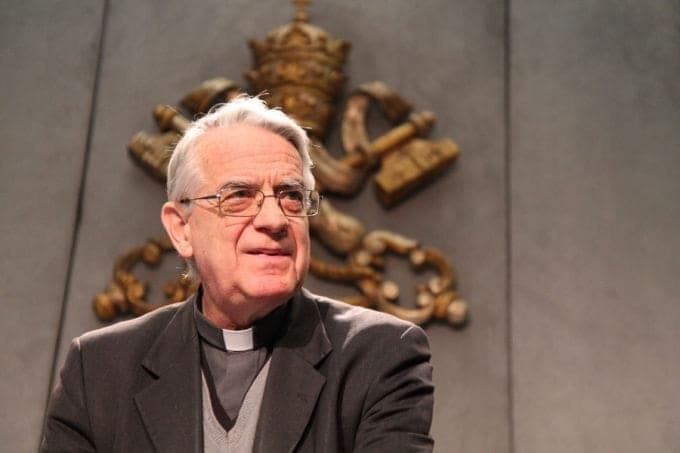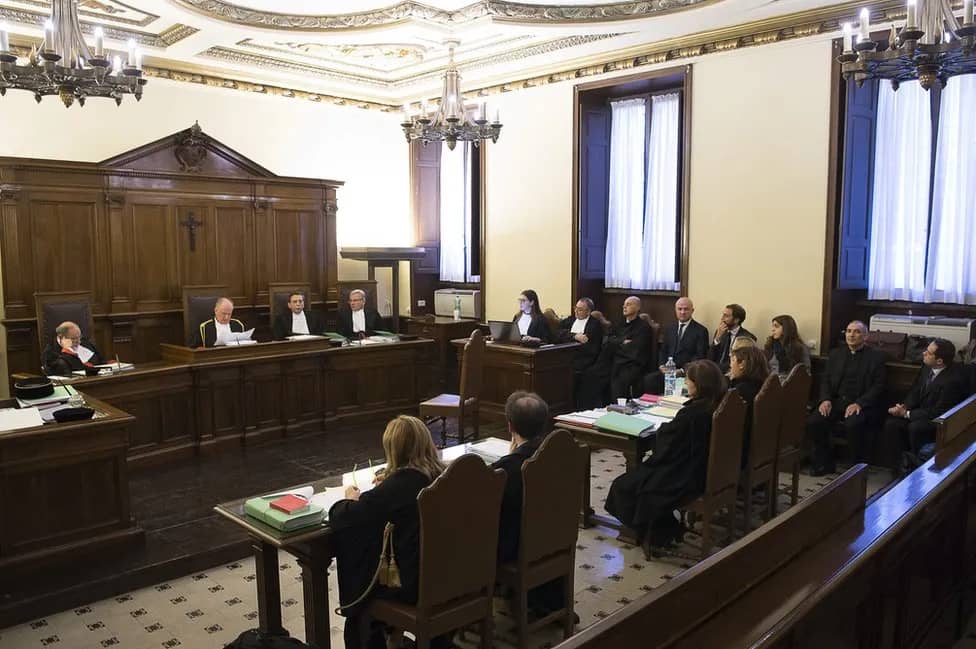Today marks the beginning of an exciting era for American Catholics, in that as of today, the official Vatican spokesman and, therefore, the most visible figure in the Catholic Church after the pope himself, is veteran American journalist Greg Burke.
A former correspondent for both Time and Fox News, Burke is a bright, committed newsman, and having an American in the spokesman’s role is good news for the Vatican and for everyone who covers the place.
What shouldn’t be lost in the shuffle, however, is that today also marks the end of Father Federico Lombardi’s run as the Vatican spokesman, and everyone who cares about the Church ought to take a moment to ponder just how enormous a sacrifice Lombardi has made over the past decade.
He took over the position in July 2006, replacing Joaquin Navarro-Valls, who had been the pope’s spokesman for 22 years. In a sense, Lombardi faced the same challenge as the pope he served, Benedict XVI, who had to fill the shoes of the legendary St. John Paul II, just as Lombardi would inevitably be measured against Navarro-Valls, whose intelligence, access, and media savvy was the stuff of legend.
Here’s what you need to know about Federico Lombardi: He never aspired to be any sort of celebrity, he always went where he was called without complaint or lament, and he’s the nicest guy in the Catholic Church.
Born in 1942 in the Piedmont region of Italy, Lombardi became a Jesuit priest in 1972 and went on to write for La Civiltà Cattolica, the influential Jesuit-edited journal in Rome that has a semi-official status with the Vatican’s Secretariat of State, and also served as the superior for the Jesuits’ Italian province.
That set a pattern for the rest of Lombardi’s life – he would rarely have just one job, but usually would be asked to perform two or three at once, because he’s good, because people like him, and because he’s just flat-out the most decent and fair human being you’ll ever encounter.
In 1991 Lombardi was named program director for Vatican Radio, which is also basically Jesuit-run, and in 2005 he became general director, meaning the guy in charge. That may not seem like much from the outside, but the radio service is the Vatican’s largest employer and, at least arguably, its most important communications outlet, so running it is generally considered one of the most complicated and important jobs in the place.
To make his life even more complicated, Lombardi became the director of the Vatican Television Center in 2001, a post he held until 2013 when Monsignor Dario Edoardo Viganò took over.
Navarro-Valls was completely identified with John Paul II, but out of loyalty he continued to serve as the Vatican spokesman through the first year of Benedict’s papacy. He made it clear, however, that he wanted to move on, and so it was that in July 2006 Lombardi was tapped for the role, while continuing also to hold his posts in both Vatican Radio and Vatican TV.
For the record, Lombardi was also serving as a counselor for the Jesuit order during all that time, so in effect he was holding four jobs that for any other mortal would have been full-time in themselves.
In all probability, the 73-year-old Lombardi would have liked to step down as soon as another pope was elected. As it turned out, however, the new pope who took office in March 2013 was a fellow Jesuit, and so Lombardi stuck around to continue handling Vatican communications for the first three years of the Pope Francis era.
Lombardi believes deeply in the power of truth, so let’s tell the truth: He did not always bat 1000.
For one thing, Lombardi doesn’t have the gift for sound-bites of either Navarro or Burke. He didn’t really emerge from the culture of big-time professional journalism as they did, and he didn’t ever quite fully understand how to phrase things in ways that worked for that world. He will often put out lengthy, carefully pondered statements that provide much useful information but little by way of “quotable quotables.”
Lombardi also took a fairly docile view of his role, which basically amounted to waiting for the pope to say something and then trying to package it as best he could. Unlike Navarro, he was not the type to go to the pope and tell him, “You need to say X,” or “You can’t say Y.” He also didn’t insist on being at the table when important decisions were made, so that how to communicate those choices could be part of the consideration.
That lapse became apparent in 2009, for instance, when the Vatican lifted the excommunications of four traditionalist bishops, including one with a history of Holocaust denial. The firestorm that followed was utterly predictable, yet Lombardi and other Vatican communications officials seemed caught off guard and struggled to offer a convincing explanation.
On the other hand, Lombardi brought a wide range of gifts to his role.
He made himself available to journalists virtually 24/7, he was always honest about what he knew and didn’t know, he never played favorites or tried to manipulate the media, he’s got an inexhaustible work ethic, and he takes a genuine personal concern in the lives of the people around him, including members of the press corps.
The highest praise I can deliver to Lombardi is this: If I had some sort of spiritual or emotional crisis while I was in Rome, he’s the priest I’d want at my side, because he’s among the most palpably caring and decent priests I’ve ever met.
Lombardi has had to face two separate sets of challenges. Under Benedict, he served a pontiff with an often negative public narrative, so he was often forced to play defense in terms of media relations. Under Francis he’s had to cope with a boss with a near-constant penchant for surprise, saying and doing things that leave his spokespersons scrambling to keep up.
Through it all, Lombardi never made the story about him, never sought to acquire power or influence, and never lost the graciousness that’s his hallmark. He’s given his entire life to service of the Church, and today certainly does not mark the end of that commitment. In fact, the Vatican announced today that he’s been named president of the “Joseph Ratzinger – Benedict XVI” foundation.
Today does, however, mark the end of the Lombardi era as papal spokesman, and all of us interested in how the Vatican and the Church are understood and perceived owe him an enormous debt of thanks.
Grazie per tutto, Padre!














